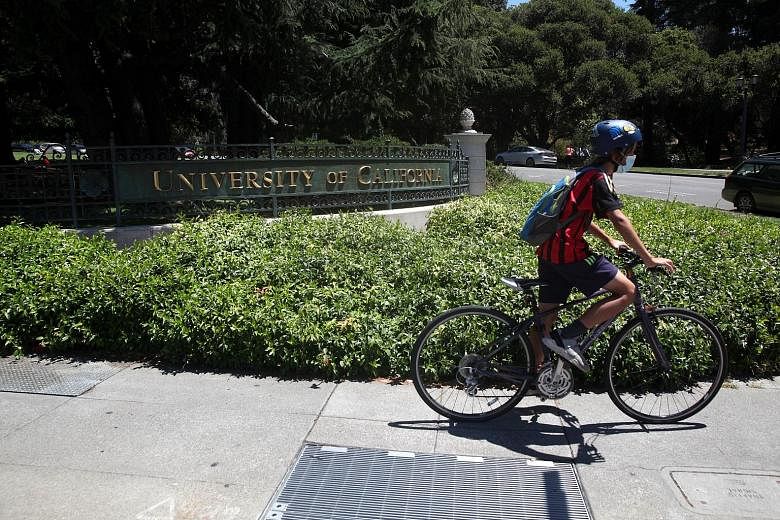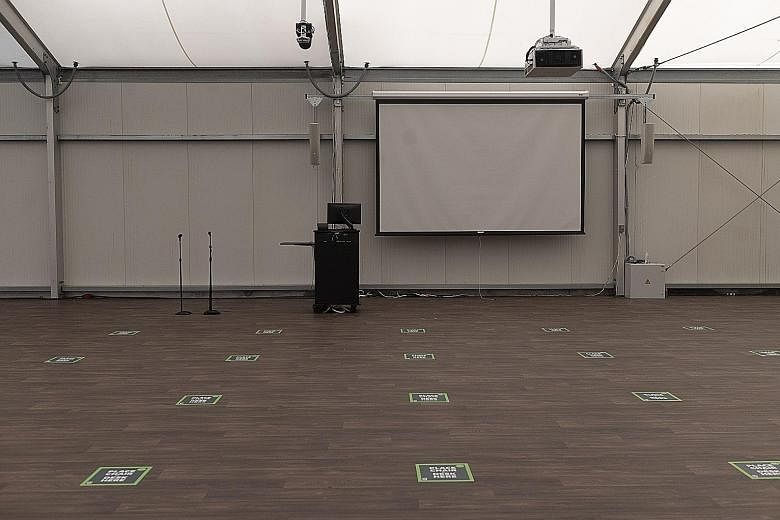NEW YORK • This month, many colleges around the United States plan to welcome back thousands of students into something they hope will resemble normal campus life.
But they face challenges unlike any other American institution: Containing the coronavirus among a young, impulsive population that not only studies together, but lives together, parties together, and, if decades of history are any guide, sleeps together.
It will be a hugely complex and costly endeavour requiring far more than just the reconfiguring of dormitory rooms and cafeterias and the construction of annexes and tent classrooms to increase social distancing.
It also crucially involves the creation of testing programmes capable of serving communities the size of small cities and the enforcement of codes of conduct among students not eager to be policed.
Who will be tested for the coronavirus and how quickly can they get results? Will mask wearing be mandated? And what will happen to tailgating, keg parties and sneaking into your partner's dorm room?
Colleges are mapping strategies as varied as the contrasting Covid-19 regulations enacted by the different American states, reflecting the culture and leadership of their schools.
Syracuse University is vowing to play the strict parent, requiring students to sign codes of conduct with penalties for violating Covid-19 rules more severe than the punishment for smoking marijuana.
But the University of Kentucky is presenting a more lenient front, adopting existing honour codes that urge students to "promote personal responsibility and peer accountability".
And the University of Texas-Austin has prohibited students from holding parties on or off campus, banned overnight guests in dorm rooms and warned students that they can be disciplined for "purposefully invading the personal space of others", at least without a face mask on.
All of these efforts are coming at great cost, potentially adding more than US$70 billion (S$96.4 billion) to the budgets of the country's 5,000 colleges.
Yet, college administrators say that giving their constituents - students and their families - at least a taste of college life is worth it, if done in the safest possible way.
Whether those constituents agree is an open question, and complaints about tuition costs have led a growing number of schools to offer rebates.
It is still possible that the frantic planning will come to naught. Almost daily, universities that had released detailed plans for in-person classes this semester have reversed these and said they will go almost entirely online.
Last Friday, the University of Pennsylvania became the latest, announcing that almost all undergraduate classes would be taught online and that undergraduates returning to Philadelphia, regardless of whether they were living on campus, would have to take a minimum of two Covid-19 tests to participate in any Penn activities this autumn.
"We have learnt how to close safely," said Mr Hiram Chodosh, president of Claremont McKenna College, a liberal arts school in Claremont, California. "But the big question now is, can we open safely?"
Testing capacity, a problem in communities throughout the country, varies widely among schools, and could play a major role in whether they can remain open during an outbreak.
Big schools, from Syracuse University to the University of California, San Diego, that have connections to labs, health programmes or medical schools say they are capable of processing large numbers of Covid-19 tests in 24 to 48 hours.
But little Cornell College in Iowa, with only 1,000 students, is not doing universal testing on arrival, believing that it would give a false sense of security because of the incubation period.
The school will be doing randomised rapid testing of 3 per cent of its asymptomatic students per week through its health centre, which will take just a few minutes to get results. It will reserve the more sophisticated testing, with the help of the county health department, for students who show symptoms.
Other small schools in similar situations are finding themselves at the mercy of private labs that can take days to deliver results, making results almost meaningless.
Equally daunting is the task of regulating the behaviour of an age group known for its risk-taking behaviour. Many schools have adopted social compacts and behaviour codes.
Masks are a key part of almost every code, to be worn except in situations like brushing teeth, walking alone outside or being alone in a dorm room. Most ban partying or socialising outside "social pods" - the small groups of students that some colleges are assigning students to, usually based on their dorms.
Penalties for code violations range from being kicked out of class and counselled, to eviction from campus housing and expulsion.
The word "sex" is not mentioned in the typical behaviour code. Some colleges may try to prohibit overnight visits in dorms, and many are stressing the obvious risks intimate contact poses.
But most administrators seem to believe that a rule banning sex is unrealistic and are quietly hoping that students will use common sense and refrain from, say, having it with people outside their pod.
"I think at some point, if you treat young people like adults, they are going to act like adults," said Dr Gordon Gee, president of West Virginia University.
NYTIMES


